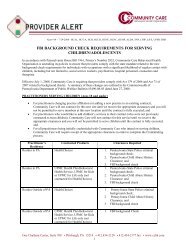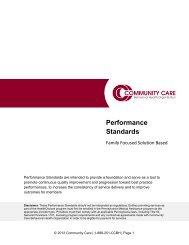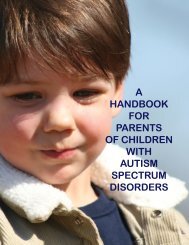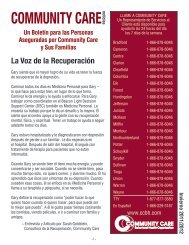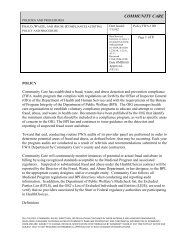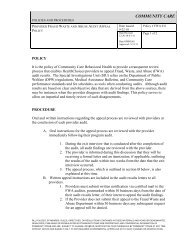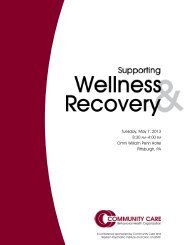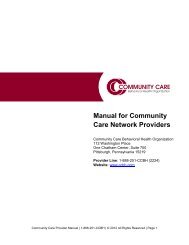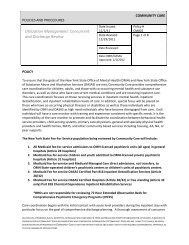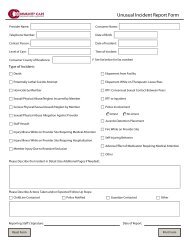Moving to Recovery - Community Care Behavioral Health
Moving to Recovery - Community Care Behavioral Health
Moving to Recovery - Community Care Behavioral Health
You also want an ePaper? Increase the reach of your titles
YUMPU automatically turns print PDFs into web optimized ePapers that Google loves.
<strong>Moving</strong> <strong>to</strong> <strong>Recovery</strong>
Assumptions…<br />
• This audience<br />
– knows something about recovery principles<br />
and person-centered care<br />
– is interested in moving from theory/values <strong>to</strong><br />
practical implementation strategies<br />
– wants <strong>to</strong> improve their skills
Objectives<br />
• <strong>Recovery</strong> Principles<br />
• Literature Review<br />
• System Integration<br />
• Practical Tools<br />
• Handout-”Packet of <strong>Recovery</strong> Materials”
<strong>Recovery</strong> Principles
<strong>Recovery</strong><br />
• The 2005 National Consensus Statement<br />
on Mental <strong>Health</strong> <strong>Recovery</strong> from SAMHSA<br />
defines mental health recovery as:<br />
– a journey of healing and transformation<br />
enabling a person with a mental health<br />
problem <strong>to</strong> live a meaningful life in a<br />
community of his or her choice while striving<br />
<strong>to</strong> achieve his or her full potential
<strong>Recovery</strong> - Hope<br />
<strong>Recovery</strong> provides the essential and motivating<br />
message of a better future— that people can and<br />
do overcome the barriers and obstacles that<br />
confront them. Hope is internalized; but can be<br />
fostered by peers, families, friends, providers, and<br />
others. Hope is the catalyst of the recovery<br />
process. Mental health recovery benefits<br />
individuals with behavioral health disabilities by<br />
focusing on their abilities <strong>to</strong> live, work, learn, and<br />
fully participate in our society, and enriches the<br />
texture of community life.
<strong>Recovery</strong> - Self-Direction<br />
Consumers lead, control, exercise choice over,<br />
and determine their own path of recovery by<br />
optimizing au<strong>to</strong>nomy, independence, and control of<br />
resources <strong>to</strong> achieve a self-determined life. By<br />
definition, the recovery process must be selfdirected<br />
by the individual, who defines his or her<br />
own life goals and designs a unique path <strong>to</strong>wards<br />
those goals.
<strong>Recovery</strong> - Individualized and<br />
Person-Centered<br />
There are multiple pathways <strong>to</strong> recovery based on<br />
an individual’s unique strengths and resiliencies<br />
as well as his or her needs, preferences,<br />
experiences (including past trauma), and cultural<br />
background in all of its diverse representations.<br />
Individuals also identify recovery as being an<br />
ongoing journey and an end result as well as an<br />
overall paradigm for achieving wellness and<br />
optimal mental health.
<strong>Recovery</strong> - Empowerment<br />
Consumers have the authority <strong>to</strong> choose from a<br />
range of options and <strong>to</strong> participate in all<br />
decisions—including the allocation of resources—<br />
that will affect their lives, and are educated and<br />
supported in so doing. They have the ability <strong>to</strong> join<br />
with other consumers <strong>to</strong> collectively and<br />
effectively speak for themselves about their<br />
needs, wants, desires, and aspirations. Through<br />
empowerment, an individual gains control of his<br />
or her own destiny and influences the<br />
organizational and societal structures in his or her<br />
life.
<strong>Recovery</strong> - Holistic<br />
<strong>Recovery</strong> encompasses an individual’s whole life,<br />
including mind, body, spirit, and community.<br />
<strong>Recovery</strong> embraces all aspects of life, including<br />
housing, employment, education, mental health<br />
and healthcare treatment and services,<br />
complementary and naturalistic services, addictions<br />
treatment, spirituality, creativity, social networks,<br />
community participation, and family supports as<br />
determined by the person. Families, providers,<br />
organizations, systems, communities, and society<br />
play crucial roles in creating and maintaining<br />
meaningful opportunities for consumer access <strong>to</strong><br />
these supports.
<strong>Recovery</strong> - Non-Linear<br />
<strong>Recovery</strong> is not a step-by step process but one<br />
based on continual growth, occasional setbacks,<br />
and learning from experience. <strong>Recovery</strong> begins<br />
with an initial stage of awareness in which a<br />
person recognizes that positive change is<br />
possible. This awareness enables the consumer<br />
<strong>to</strong> move on <strong>to</strong> fully engage in the work of<br />
recovery.
<strong>Recovery</strong> - Strengths-Based<br />
<strong>Recovery</strong> focuses on valuing and building on the<br />
multiple capacities, resiliencies, talents, coping<br />
abilities, and inherent worth of individuals. By<br />
building on these strengths, consumers leave<br />
stymied life roles behind and engage in new life<br />
roles (e.g., partner, caregiver, friend, student,<br />
employee). The process of recovery moves<br />
forward through interaction with others in<br />
supportive, trust-based relationships.
<strong>Recovery</strong> - Respect<br />
<strong>Community</strong>, systems, and societal acceptance<br />
and appreciation of consumers —including<br />
protecting their rights and eliminating<br />
discrimination and stigma—are crucial in<br />
achieving recovery. Self-acceptance and<br />
regaining belief in one’s self are particularly vital.<br />
Respect ensures the inclusion and full<br />
participation of consumers in all aspects of their<br />
lives.
<strong>Recovery</strong> - Responsibility<br />
Consumers have a personal responsibility for<br />
their own self-care and journeys of recovery.<br />
Taking steps <strong>to</strong>wards their goals may require<br />
great courage. Consumers must strive <strong>to</strong><br />
understand and give meaning <strong>to</strong> their<br />
experiences and identify coping strategies and<br />
healing processes <strong>to</strong> promote their own<br />
wellness.
<strong>Recovery</strong> - Peer Support<br />
Mutual support—including the sharing of<br />
experiential knowledge and skills and social<br />
learning—plays an invaluable role in recovery.<br />
Consumers encourage and engage other<br />
consumers in recovery and provide each other<br />
with a sense of belonging, supportive<br />
relationships, valued roles, and community.
<strong>Community</strong> <strong>Care</strong>’s <strong>Recovery</strong> Goals<br />
• Transforming the attitudes of all those who are<br />
directly or indirectly involved with the behavioral<br />
health system <strong>to</strong> believing that recovery is<br />
possible for all, empowerment and integration<br />
for all behavioral health consumers is essential,<br />
and shared decision-making at all levels is key.
<strong>Community</strong> <strong>Care</strong>‘s <strong>Recovery</strong> Goals<br />
• Imparting knowledge <strong>to</strong> peers and staff regarding<br />
innovative and evidence-based practices <strong>to</strong><br />
promote recovery.<br />
• Building the skills of all stakeholders <strong>to</strong> promote<br />
effective recovery-oriented, consumer-driven<br />
services.
<strong>Community</strong> <strong>Care</strong>’s <strong>Recovery</strong> Focus<br />
• A contract with Pat Deegan, Ph.D. & Associates,<br />
in partnership with Advocates for Human Potential<br />
(AHP).<br />
– To provide consultation and training on their<br />
system-wide effort <strong>to</strong> implement recoveryoriented<br />
services at all levels of their behavioral<br />
health service system.<br />
• <strong>Recovery</strong> education and training<br />
• RoadMap <strong>to</strong> <strong>Recovery</strong><br />
• Steps of <strong>Recovery</strong><br />
• Conferences
<strong>Community</strong> <strong>Care</strong>’s <strong>Recovery</strong><br />
Philosophy<br />
<strong>Community</strong> <strong>Care</strong>’s recovery philosophy is<br />
grounded in the belief that recovery from mental<br />
illness is not the privilege of a few, but a<br />
possibility for everyone.
<strong>Recovery</strong> Characteristics<br />
Mental health systems that support recovery<br />
are characterized by:<br />
• Consumer voice and choice.<br />
• Person-centered planning.<br />
• Evidence-based practices.<br />
• A skilled workforce including peer<br />
specialists.
<strong>Recovery</strong> Characteristics<br />
• Medical staff who are skilled in shared<br />
decision making.<br />
• <strong>Community</strong> integration outcomes that<br />
include a job, home, transportation, and<br />
discretionary income.
<strong>Recovery</strong> Learning <strong>Community</strong><br />
• Includes web site (www.recoverylearning.com ),<br />
consumer advisory committee, on- and off-site<br />
technical assistance, an annual training institute,<br />
and special project development.<br />
• Uses a high-tech, high-<strong>to</strong>uch approach, <strong>to</strong><br />
develop and deliver a shared learning<br />
opportunity, on-site technical assistance and<br />
men<strong>to</strong>ring, assistance with implementation<br />
efforts, and captures lessons learned.
Substance Abuse <strong>Recovery</strong><br />
• People, places,<br />
and things<br />
• Shame<br />
• Self-medication<br />
• Substitute<br />
addictions<br />
• Safety and anxiety<br />
• Relevance of<br />
family and<br />
significant others<br />
• Dual Diagnosis<br />
• Co-Dependence<br />
• Denial<br />
• Spirituality
Substance Abuse <strong>Recovery</strong><br />
• Must recognize the inter-relationship of<br />
the:<br />
– Individual<br />
– Environment<br />
– Substance
Substance Use <strong>Recovery</strong> is About:<br />
• Feelings<br />
• Acceptance<br />
• Growth<br />
• Surrender<br />
• Trust<br />
• Willingness<br />
• Spirituality<br />
• Freedom<br />
• Love<br />
• Life
A Definition of <strong>Recovery</strong><br />
• <strong>Recovery</strong> is a self-determined and holistic<br />
journey that people undertake and grow.<br />
<strong>Recovery</strong> is facilitated by relationships and<br />
environments that provide hope,<br />
empowerment, choices and opportunities<br />
that promote people reaching their full<br />
potential as individuals and community<br />
members.<br />
-from “A Call for Change: Toward a <strong>Recovery</strong>-<br />
Oriented Mental <strong>Health</strong> Service System for Adults”
Mental <strong>Health</strong> <strong>Recovery</strong><br />
• Must recognize the inter-relationship of<br />
the:<br />
– Individual<br />
– Environment<br />
– Diagnosis
Influences on <strong>Recovery</strong><br />
• Degree of illness experienced.<br />
• +/- impact and/or intervention of others<br />
including the <strong>Behavioral</strong> <strong>Health</strong> system.<br />
• Interaction with and/or reactions <strong>to</strong>:<br />
– hospitalizations<br />
– medications<br />
– incarceration<br />
– interpersonal relations
Key Areas of Concern<br />
• Access <strong>to</strong> good clinical healthcare.<br />
• Identifying and developing supportive<br />
relationships.<br />
• Determining and accessing meaningful<br />
activity.<br />
• Gaining personal power and control over<br />
life.<br />
• Overcoming stigma.
Key Points of <strong>Recovery</strong><br />
• Developing strong relationships with<br />
caring, encouraging, hopeful people.<br />
• Self-determination.<br />
• Self-moni<strong>to</strong>ring and self-management.<br />
• Vocational activity and schooling.
Key Points (cont’d)<br />
• Developing a sense of meaning and<br />
purpose.<br />
• Knowledge and acceptance.<br />
• Self-help and peer support.
Partners in <strong>Recovery</strong><br />
• Consumer<br />
– Depends upon the clinician, family, and<br />
community <strong>to</strong> provide the best possible<br />
services.<br />
• Clinician<br />
• Family and community<br />
– Supports in an anti-stigma environment<br />
– Housing, employment, peer support<br />
– Funding
Role of Clinical <strong>Care</strong><br />
• Traditionally focus was on illness and<br />
symp<strong>to</strong>ms.<br />
• <strong>Recovery</strong> embraces the individual’s<br />
strengths and focuses on wellness.<br />
• Individual is a partner, another expert.<br />
• Clinician works side by side with consumer<br />
<strong>to</strong> display respect.
Consumer Choice<br />
• Consumers must know and understand<br />
that they are entitled <strong>to</strong> make choices<br />
regarding behavioral health services and<br />
supports they receive.
The Road <strong>to</strong> <strong>Recovery</strong><br />
• Consumer directed<br />
• Strengths based<br />
• Culturally competent<br />
• Utilizes community/natural supports
Best Practice Principles<br />
• The consumer directs the recovery process<br />
and is an essential part of the team.<br />
• Individual differences are considered and<br />
valued.<br />
• A holistic approach is utilized:<br />
– Medical, Psychological, Social, and <strong>Recovery</strong><br />
intervention models are merged.
Best Practice Principles (cont’d)<br />
• Strengths and assets are identified and<br />
emphasized.<br />
• A collaborative recovery management plan<br />
is developed.<br />
• Families, as defined by the consumer, are<br />
involved.<br />
• Services are within the consumer’s<br />
community.
Outcomes of <strong>Recovery</strong><br />
• Increased Motivation<br />
• Increased Self-Esteem<br />
• Feeling a part of instead of isolated from<br />
• Self respect<br />
• Desire <strong>to</strong> help others<br />
• Hope instead of despair
Outcomes of <strong>Recovery</strong> (cont’d)<br />
• Optimal functioning<br />
• To live in the community<br />
• To participate in the lifestyle of the<br />
individual’s choice
Literature Review
Literature Review<br />
• Courtney Harding, PhD<br />
• Patricia Deegan, PhD<br />
• Daniel Fisher, MD, PhD<br />
• Mary Ellen Copeland, MS, MA<br />
• Priscilla Ridgway, PhD<br />
• LeRoy Spaniol, PhD<br />
• William White, MA
Courtney Harding, PhD<br />
• Longitudinal research with individuals diagnosed<br />
with Schizophrenia.<br />
• People with mental illness can and do recover.<br />
– Looked at a period of 20-30 yrs.<br />
Empirical Correction of Seven Myths About Schizophrenia with Implications for<br />
Treatment, by Courtenay M. Harding, Ph.D., and James H. Zahniser, ACTA<br />
Psyciatrica Scandinava, 1994: 90 (suppl 384): 140-146.<br />
The Vermont Longitudinal Study of Persons With Severe Mental Illness, II: Long-<br />
Term Outcomes of Subjects Who Retrospectively Met DSM-III Criteria for<br />
Schizophrenia, by Courtenay M. Harding, Ph.D., George W. Brooks, M.D.,<br />
Takamaru Ashikaga, Ph.D., John S. Strauss, M.D., and Alan Breier, M.D.,<br />
American Journal of Psychiatry 144:6, June 1987.
Patricia Deegan, PhD<br />
• Multiple publications and research projects<br />
• Tools<br />
– Individual<br />
– System<br />
• Common Ground<br />
• Shared decision making<br />
• Decisional uncertainty<br />
• Hearing Voices<br />
http://www.patdeegan.com/
Daniel Fisher, MD, PhD<br />
• Psychiatrist diagnosed with Schizophrenia.<br />
• Focuses on medication issues.<br />
• Established the National Empowerment<br />
Center.<br />
http://www.power2u.org/who.html
Mary Ellen Copeland, MS, MA<br />
• Motivational speaker, and recovery<br />
educa<strong>to</strong>r.<br />
• Emphasizes “wellness”<br />
• Has designed WRAP plan<br />
– Utilizes a “train the trainer” model.<br />
http://www.mentalhealthrecovery.com/
Priscilla Ridgway, PhD<br />
• Research and materials development<br />
– Consumer Workbook-<br />
• Can be used independently of the therapist or as<br />
a supplement <strong>to</strong> treatment.<br />
• Takes a strengths based approach <strong>to</strong><br />
recovery, using incremental steps.<br />
• Has developed evaluation <strong>to</strong>ols for<br />
systems<br />
– ROSI, REE, ERFS<br />
http://www.yale.edu/PRCH/people/PriscillaRidgwayPh.D..html
LeRroy Spaniol, PhD<br />
• Created workbooks for recovery.<br />
• Designed for therapists <strong>to</strong> utilize with<br />
consumers.<br />
• Culturally competent Spanish version.<br />
http://search.bu.edu/searchq=spaniol&Submit=Search&site=default_collection<br />
&output=xml_no_dtd&client=default_frontend&sort=date%3AD%3AL%3Ad1&proxyst<br />
ylesheet=default_frontend&oe=UTF-8
William White, MA<br />
• Substance use recovery relationship <strong>to</strong><br />
behavioral health recovery.<br />
• Extensive writings and material<br />
development.<br />
http://www.facesandvoicesofrecovery.org/resources/publications_white.php
IRETA<br />
• <strong>Recovery</strong> materials<br />
– Includes co-occurring information<br />
• Theory and application<br />
http://www.ireta.org/
Systems Materials<br />
• Connecticut<br />
• Ohio<br />
• Georgia<br />
• Illinois<br />
www.ct.gov/dmhas/lib/dmhas/publications/practiceguidelines.pdf<br />
http://www.mhrecovery.com/best_practices.htm<br />
http://www.mentalhealthworld.org/48GCPSP.htm<br />
http://www.illinoismentalhealthcollaborative.com/consumers/consumer_resources.htm<br />
• Alaska<br />
http://akmhcweb.org/<br />
• Pennsylvania http://www.parecovery.org/principles_change.shtml<br />
• New York<br />
www.carecoordination.org/video_guide.pdf
System Change
Transformation<br />
• A break with the past<br />
• Quantum change<br />
• More than just reorganizing<br />
–new mission and vision for the organization<br />
• Transformation virtually always refers <strong>to</strong> a<br />
positive change<br />
– a movement <strong>to</strong> a new venture<br />
• A radical redesign and new strategic intent<br />
for the organization
Transformation Principles<br />
• Services and treatments must be consumer and<br />
family centered, geared <strong>to</strong> give individuals real<br />
and meaningful choices about treatment options<br />
and providers – not oriented <strong>to</strong> the requirements<br />
of bureaucracies<br />
• <strong>Care</strong> must focus on increasing a person’s ability<br />
<strong>to</strong> successfully cope with life’s challenges, on<br />
facilitating recovery, and on building resilience,<br />
not just on managing symp<strong>to</strong>ms<br />
President’s New Freedom Commission on Mental <strong>Health</strong>
Goal of <strong>Recovery</strong> Transformation<br />
The goal of recovery is:<br />
• To move from a state of<br />
dependency <strong>to</strong><br />
interdependency<br />
•To have all aspects of<br />
society and organizations<br />
utilizing recovery<br />
principles
Setting the Compass<br />
Experience of Individuals,<br />
Families and Communities<br />
Microsystems of<br />
<strong>Care</strong><br />
Where care occurs<br />
<strong>Health</strong> <strong>Care</strong><br />
Organizations<br />
External Environment of <strong>Care</strong><br />
Policy/Financing/Regulation
Change Model<br />
Competency<br />
knowledge, skills and abilities<br />
Change<br />
Management<br />
behavior and<br />
attitude<br />
Project<br />
Management<br />
work / business<br />
flow
Competencies<br />
• Providers should be able <strong>to</strong><br />
– understand the concepts of recovery,<br />
resilience, wellness, person-centered and<br />
culturally competent approaches<br />
– understand and value the centrality of the<br />
individual planning process as a roadmap <strong>to</strong><br />
recovery and wellness<br />
– understand how emerging new frameworks<br />
differ from past and current practice<br />
– identify the elements of a plan and the criteria<br />
for each element
Competencies<br />
• Providers should be able <strong>to</strong><br />
– understand the concept of medical necessity<br />
and key elements of documentation<br />
– conduct a strengths based person-centered<br />
and culturally competent assessment<br />
– create a formulation or integrated summary<br />
based upon the assessment<br />
– evaluate the individual’s/families stage of<br />
change <strong>to</strong> inform and guide the planning<br />
process<br />
– help individuals/families articulate personcentered<br />
goals and discharge/transition needs
Competencies<br />
• Providers should be able <strong>to</strong><br />
– help individuals/families articulate<br />
person-centered goals and<br />
discharge/transition needs<br />
– identify barriers and establish priorities <strong>to</strong><br />
attaining the goal's<br />
– elaborate objectives <strong>to</strong> resolve barriers in<br />
partnership with the person and family served<br />
– build on strengths, choices, preferences and<br />
stage of change <strong>to</strong> recommend interventions,<br />
services, supports and other strategies <strong>to</strong><br />
promote positive change
Competencies<br />
• Providers should be able <strong>to</strong><br />
– specify a broad range of<br />
culturally-competent stage<br />
appropriate supports / services<br />
– accept the individuals’ / families’ dignity, ability<br />
<strong>to</strong> take risk and “right <strong>to</strong> fail”<br />
– facilitate/moni<strong>to</strong>r/coordinate plan<br />
implementation<br />
– provide timely update of assessment and plan<br />
– properly document plan elements and services<br />
– participate in an ongoing quality management<br />
process with outcome data
12 Aspects of Staff Transformation<br />
1. Looking forward and rebuilding the passion<br />
2. Building inspiration and belief in recovery<br />
3. Changing from treating illness <strong>to</strong> helping people<br />
with illnesses have better lives<br />
4. <strong>Moving</strong> from caretaking <strong>to</strong> empowering, sharing<br />
power and control<br />
5. Gaining comfort with mentally ill co-staff and<br />
multiple roles<br />
6. Valuing the subjective experience<br />
Mark Ragins, MD
Staff Transformation con’t<br />
7. Creating therapeutic relationships<br />
8. Lowering emotional walls and becoming a<br />
guiding partner<br />
9. Understanding the process of recovery<br />
10.Becoming involved in the community<br />
11.Reaching out <strong>to</strong> the rejected<br />
12.Living recovery values<br />
Mark Ragins, MD
Guideline Categories<br />
• Administration<br />
• Treatment<br />
• Supports
Mission and Vision<br />
• Development of mission and vision<br />
statements articulating organizational<br />
commitment <strong>to</strong> recovery and a process for<br />
achieving recovery oriented services.<br />
• Organizational review and strategic<br />
planning process that incorporates diverse<br />
viewpoints from the community of service<br />
users.
Organizational Structure<br />
• Annual budget insures adequate<br />
resources <strong>to</strong> support consumer<br />
participation in administrative processes.<br />
• Significant representation of persons in<br />
recovery on organization’s treatment and<br />
support staff.
Training and Continuing Education<br />
• Processes developed for interactions<br />
and/or communications between<br />
consumer and providers in non-clinical<br />
settings.<br />
• Establishment of core competency<br />
standards regarding knowledge of<br />
recovery principles for all staff.
Continuous Quality Improvement<br />
• Processes in place <strong>to</strong> ensure that<br />
consumers are included in CQI activities<br />
as equal partners with professionals.<br />
• Agency budgets will reflect compensation<br />
for consumer involvement in CQI activities.
Outcome Assessment<br />
• Outcome indica<strong>to</strong>rs will include items<br />
related <strong>to</strong> quality of life, recovery and self<br />
fulfilling function.<br />
• Established process for consumer<br />
participation in developing outcome<br />
indica<strong>to</strong>rs for progress in recovery.
Service Arrays<br />
• Integration of consumer, family and peer<br />
supports, disease management education<br />
and crisis management planning will be<br />
reflected in policy and procedure<br />
documents.<br />
• Establishment of services supportive of<br />
recovery processes and which incorporate<br />
self management principles.
Drowning in Help #1
Drowning in Help #2
Drowning in Help #3
The Moral of the S<strong>to</strong>ry<br />
• There may be <strong>to</strong>o many reports on drowning<br />
and not enough life preservers.<br />
• Help isn’t help if it’s not helpful <strong>to</strong> the person<br />
receiving services. It can be <strong>to</strong>xic help.<br />
• Help is always co-created between the<br />
professional and client.<br />
• <strong>Recovery</strong> is a self-directed process of healing<br />
and transformation that can be supported by the<br />
professional, peers, family and the community.
Transformation<br />
T =<br />
V = vision<br />
B = beliefs<br />
A = action<br />
(V + B + A) x (CQI) 2<br />
Resistance<br />
<strong>to</strong> change<br />
CQI = continuous quality improvement
Transformation Principles<br />
• Develop relationships with people, not<br />
disorders.<br />
• Nothing about us without us!<br />
• Practice respect.<br />
• <strong>Recovery</strong> is real!<br />
• <strong>Recovery</strong> is hard work!<br />
• <strong>Recovery</strong> is universal.<br />
• <strong>Recovery</strong> includes the whole community.
Affirmation<br />
Everybody is Somebody<br />
Nobody is a Waste of My Time
Access
What’s In A Word<br />
• Clinical language can be disrespectful<br />
– Crazy<br />
– Honey<br />
– You’re doing well for a schizophrenic<br />
– She is such a borderline<br />
– He is decompensating<br />
– She is low functioning/high functioning<br />
– He’s a harmless burnt out schizophrenic
People With Psychiatric Disabilities are<br />
Resilient<br />
I Am Not The<br />
Problem!<br />
I Am Part of the<br />
Solution
Affirmation<br />
<strong>Recovery</strong> means<br />
changing our lives,<br />
not our<br />
biochemistry
Nuts and Bolts
A Definition of <strong>Recovery</strong><br />
• <strong>Recovery</strong> is a self-determined and holistic<br />
journey that people undertake and grow.<br />
<strong>Recovery</strong> is facilitated by relationships and<br />
environments that provide hope,<br />
empowerment, choices and opportunities<br />
that promote people reaching their full<br />
potential as individuals and community<br />
members.<br />
-from “A Call for Change: Toward a <strong>Recovery</strong>-Oriented<br />
Mental <strong>Health</strong> Service System for Adults”
<strong>Recovery</strong> is Being Person-centered<br />
in Practice<br />
• The consumer as a whole person<br />
• Sharing power and responsibility<br />
• Having a therapeutic alliance<br />
• The clinician as a person<br />
• Language choices
“If you don’t know where you are<br />
going, you will probably end up<br />
somewhere else.”<br />
Lawrence J. Peter
Planning Processes<br />
• Development of collaborative process for<br />
developing continuous comprehensive<br />
service plans between consumers and<br />
providers.<br />
• Process in place <strong>to</strong> inform consumers of<br />
treatment/service options and <strong>to</strong> discuss<br />
pros and cons of each prior <strong>to</strong> service plan<br />
development.
A Plan is a Road Map<br />
Provides hope by breaking a seemingly<br />
overwhelming journey in<strong>to</strong> manageable steps for<br />
both the provider and the person served.<br />
B C D<br />
A<br />
E<br />
“life is a journey…not a destination”
Building a Plan<br />
Outcomes<br />
Services<br />
Objectives<br />
Strengths/Barriers<br />
Goals<br />
Prioritization<br />
Understanding<br />
Assessment<br />
Request for services
Goals<br />
• Three types<br />
– life goals<br />
– treatment goals<br />
– quality of life / enhancement goals<br />
• Essential features<br />
– Attainable, realistic, written in positive terms<br />
• built upon abilities / strengths, preferences and<br />
needs<br />
• embody hope<br />
• alternative <strong>to</strong> current circumstances
Barriers<br />
• What keeps a person from<br />
their goals<br />
– Intrusive or burdensome<br />
symp<strong>to</strong>ms<br />
• Challenges or needs as a result of a co-occurring<br />
disorder<br />
– Lack of resources<br />
– Need for assistance, supports, skills<br />
development<br />
– Housing, employment<br />
– Lack of relationships or meaningful activity
Strengths<br />
• Environmental fac<strong>to</strong>rs that will increase<br />
the likelihood of success:<br />
– community supports, family/relationship,<br />
support/involvement, work<br />
• Competencies/accomplishments<br />
• Past successful strategies<br />
• Motivation, interests and activities<br />
• Services are not an objective
Stages of Change and <strong>Recovery</strong><br />
• Prochaska and DiClemente<br />
• Ohio Department of MH<br />
• The Village—LA County MHA<br />
• Stanislaus County<br />
• Bos<strong>to</strong>n University Center for Psychiatric<br />
Rehabilitation Center<br />
• AACP / LOCUS
Stages of <strong>Recovery</strong> and Treatment<br />
Ohio<br />
Village<br />
Prochaska &<br />
DiClemente<br />
Stage of<br />
Treatment<br />
Treatment Focus<br />
Dependent<br />
unaware<br />
High risk/<br />
Unidentified or<br />
Unengaged<br />
Precontemplation<br />
Engagement<br />
• outreach<br />
• practical help<br />
• crisis intervention<br />
• relationship<br />
building<br />
Dependent<br />
aware<br />
Poorly<br />
coping/Engaged<br />
/not self-directed<br />
Contemplation<br />
/preparation<br />
Persuasion<br />
• psycho-education<br />
• set goals<br />
• build awareness<br />
Independent<br />
aware<br />
Coping/Self<br />
responsible<br />
Action<br />
Active<br />
Treatment<br />
• counseling<br />
• skills training<br />
• self-help groups<br />
Interdependent<br />
aware<br />
Graduated or<br />
Discharged<br />
Maintenance<br />
Relapse<br />
Prevention<br />
• prevention plan<br />
• skills training<br />
• expand recovery
Dependent<br />
Unaware<br />
Dependent<br />
Aware<br />
Independent<br />
Aware<br />
Interdependent<br />
Aware
Meeting client where they’re at…<br />
ADDICTION RECOVERY<br />
Prevention<br />
Early<br />
Intervention<br />
Pre<br />
Contemplation<br />
Contemplation Action Relapse<br />
Prevention<br />
Sustained<br />
<strong>Recovery</strong><br />
Each person is able <strong>to</strong> utilize interventions<br />
responsive <strong>to</strong> their stage of change<br />
Prevention<br />
Early Identification<br />
and Intervention<br />
Pre-<br />
Contemplation<br />
Contemplation<br />
Engaged in Active<br />
Treatment and Rehab<br />
Self<br />
<strong>Care</strong><br />
MENTAL HEALTH RECOVERY
Another view of recovery stages…<br />
Impact of the<br />
illness<br />
Life is<br />
limited<br />
Change is<br />
possible<br />
Commitment<br />
<strong>to</strong> change<br />
Actions for<br />
change<br />
Overwhelmed<br />
Not ready <strong>to</strong><br />
commit <strong>to</strong><br />
change<br />
Believes there<br />
is more <strong>to</strong> life<br />
Willing <strong>to</strong><br />
explore<br />
possibilities<br />
Taking<br />
responsibility<br />
for a new<br />
direction<br />
derived from BU Center for Psych Rehab
as suggested by<br />
Ed Knight<br />
overwhelmed<br />
by…<br />
The person is…<br />
moving<br />
beyond…<br />
…the<br />
disabling<br />
power of<br />
the<br />
illness<br />
challenging…<br />
questioning…<br />
giving in<br />
<strong>to</strong>…
Integration of Addiction and Mental<br />
<strong>Health</strong> <strong>Recovery</strong><br />
• Establishment of recovery principles as<br />
unifying concepts in provision of holistic<br />
mental health, physical health and<br />
addiction services.<br />
• The presence of co-occurring substance<br />
and mental health disorders is reliably<br />
detected through screening processes.
Advance Directives<br />
• Established process for obtaining informed<br />
advance directives from consumers during<br />
periods of relatively healthy function.<br />
• Established process for review of advance<br />
directives during periods of<br />
relapse/incapacitation.
Coercive Treatment<br />
• Development of strategies <strong>to</strong> engage and<br />
empower clients on involuntary status that<br />
are incorporated in<strong>to</strong> treatment plans and<br />
agency programming.<br />
• Demonstration of reduction in the use of<br />
coerced treatment options over defined<br />
periods.
Advocacy and Mutual Support<br />
• Active facilitation of participation of clients<br />
in advocacy organizations is<br />
demonstrated.<br />
• An agency liaison with local advocacy and<br />
support groups is identified and active.
Access Facilitating Processes<br />
• Completion of access analysis identifying<br />
systemic barriers <strong>to</strong> receiving services.<br />
• Service users report satisfaction with their<br />
access <strong>to</strong> services they have chosen.
Family Services<br />
• Family involvement in agencies will be<br />
reflected in educational, social and<br />
advocacy programming by the agency.<br />
• Liaison and collaboration with advocacy<br />
groups will be reflected in family oriented<br />
programming.
Employment and Education<br />
• Development of an array of employment<br />
and training opportunities with various<br />
levels of support.<br />
• Process for vocational counseling and<br />
support is integrated with other aspects of<br />
the recovery process.
Housing<br />
• Consumers feel that their housing choices<br />
are respected <strong>to</strong> the greatest extent<br />
possible.<br />
• A wide array of housing options and<br />
available, including various <strong>to</strong>lerant<br />
housing options.
Medication<br />
• Medication is not just an MD thing.<br />
• What is individual’s role<br />
• Decisional uncertainty.<br />
• Education.
Principles<br />
• Use in Conjunction with Psycho-social<br />
Approaches.<br />
• Simplicity.<br />
• Timing.<br />
• Target Symp<strong>to</strong>ms/Diagnostic Clarity<br />
(substance induced vs real).<br />
• Understand consumer's perspective.<br />
• Emotional climate.
<strong>Community</strong> <strong>Care</strong> RoadMAP Project<br />
• Medication algorithm specific <strong>to</strong> schizophrenia,<br />
consumer portion applicable <strong>to</strong> all illnesses.<br />
• Educational support <strong>to</strong> physicians, consumers,<br />
families.<br />
• Four Allegheny County agencies provide at 7<br />
sites.<br />
• RoadMAP facilita<strong>to</strong>rs and <strong>Community</strong> <strong>Care</strong> meet<br />
on a regular basis.<br />
• Facilita<strong>to</strong>r trainings scheduled in Oc<strong>to</strong>ber for two<br />
agencies in both Berks and Chester Counties.
RoadMAP <strong>to</strong> <strong>Recovery</strong><br />
• A quality improvement initiative designed<br />
<strong>to</strong> involve consumers, practitioners, family<br />
members and supporters in a unified effort<br />
<strong>to</strong> practice evidence-based medication<br />
prescribing <strong>to</strong> promote optimal consumer<br />
recovery.
SAMHSA Evidence Based<br />
Practices<br />
• Illness Management and <strong>Recovery</strong>.<br />
• Assertive <strong>Community</strong> Treatment.<br />
• Family Psychoeducation.<br />
• Supported Employment.<br />
• Integrated Dual Diagnosis Treatment.<br />
• http://mentalhealth.samhsa.gov/cmhs/communitys<br />
upport/<strong>to</strong>olkits/about.asp
Effective Use of Resources<br />
• Progressive Continuums.<br />
• Overlapping and Integrated Levels of<br />
Resource Intensity.<br />
• Linking Phases of Treatment.<br />
• Quality Processes <strong>to</strong> Enhance Utilization.
Comprehensiveness<br />
• Includes an array of arrangements<br />
sufficient <strong>to</strong> meet all identified needs.<br />
• Case management, child care, residential<br />
support, financial assistance, mutual<br />
support, etc.
Coordination and Integration<br />
• Concurrent involvement of agencies on<br />
both sides of the transition occurs.<br />
• Information sharing.<br />
• System creates rational incentives for<br />
coordination.
Continuity in Planning<br />
• Building on established treatment plans<br />
when successful.<br />
• Plan is continuous across entire episode<br />
of illness/disability.<br />
• Regional standardization of planning<br />
formats.
Support System Involvement<br />
• Family and other significant members of<br />
support system, as identified by service<br />
user, <strong>to</strong> be included in planning process.<br />
• Significant efforts <strong>to</strong> enlist participation are<br />
documented .
Cultural Sensitivity<br />
• Recognition of individual’s beliefs,<br />
cus<strong>to</strong>ms, and social context in planning<br />
process.<br />
• Transition plan reflects these cultural<br />
considerations.
Prevention<br />
• Relapse prevention, using his<strong>to</strong>rical<br />
context for episodes of illness,<br />
incorporated in<strong>to</strong> the plan.<br />
• Appropriate use of community resources.
Resource Access<br />
• Maximize access <strong>to</strong> available resources.<br />
• Encourage au<strong>to</strong>nomy and recovery in<br />
obtaining necessary resources.
<strong>Community</strong> <strong>Care</strong> Initiatives<br />
• CTT.<br />
• RoadMAP.<br />
• Collaboration with ACCR.<br />
• <strong>Recovery</strong> Conferences.<br />
• <strong>Recovery</strong> Institutes.
Collaboration: Allegheny County of<br />
Coalition for <strong>Recovery</strong><br />
• Group of consumers, families, agency and<br />
county representatives, and other stakeholders.<br />
• Resilience and children/youth statements.<br />
• Universality statement.<br />
• Social Marketing Campaign.<br />
• Booklet development.<br />
• Dialogues.<br />
• Development of community partnerships.
Success is not final, failure is not<br />
fatal: it is the courage <strong>to</strong> continue<br />
that counts.<br />
Wins<strong>to</strong>n Churchill
Concluding Thoughts<br />
(How Does Each Of Us)<br />
Become the change that we want <strong>to</strong> see in the<br />
world.<br />
Mohandas Gandi<br />
(Can we become)<br />
A small group of thoughtful people can change the<br />
world. Indeed, it's the only thing that ever has.<br />
Margaret Mead<br />
…



